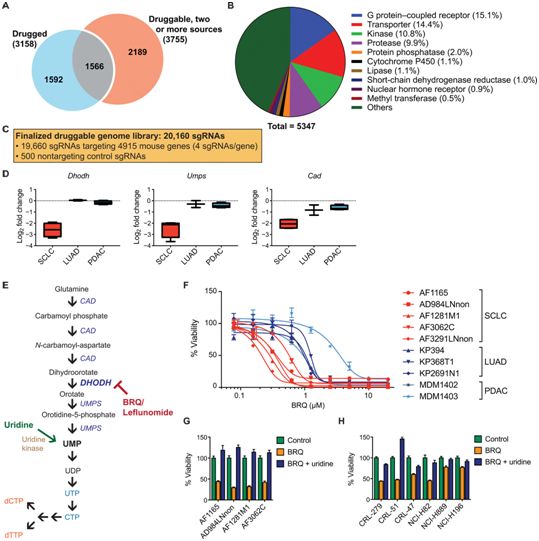Inhibition of DHODH Is Expected to Treat Small Cell Lung Cancer
Small cell lung cancer is highly aggressive lung cancer with limited treatment options. In a new study, researchers from the Massachusetts Institute of Technology identified a novel therapeutic target for this type of lung cancer. The results of the study were published in the journal of Science Translational Medicine.
Lung cancer is the leading cause of cancer-related deaths in the United States and worldwide, with a five-year survival rate of less than 20%. However, in terms of the two major subtypes of lung cancer, small cell lung cancer and non-small cell lung cancer, small cell lung cancer is more aggressive and has a worse prognosis. Small cell lung cancer tumors grow rapidly and are able to metastasize earlier, so the patient's five-year survival rate is about 6%.
According to Tyler Jacks, the author of the paper and director of the Koch Comprehensive Cancer Institute at the Massachusetts Institute of Technology, “unfortunately, unlike other lung tumors, there is no new way to treat small cell lung cancer. In fact, the current treatment of patients is roughly the same as that of 40 or 50 years ago, so it is clear that there is an urgent need to develop new treatments.”
This new study shows that small cell lung cancer cells are particularly dependent on the pyrimidine biosynthetic pathway, and an enzyme inhibitor called Brequinar is effective against this disease in cell lines and mouse models.
The Disorder of Cell Replication
Researchers at Jacks Laboratories use CRISPR to screen genes in small cell lung cancer cell lines that have been targeted or may be targeted by drugs in order to find therapeutic targets that can be tested more quickly and more easily in a clinical setting.
These researchers found that small cell lung cancer tumors are particularly sensitive to deletions in genes encoding dihydroorotate dehydrogenase (DHODH), a key enzyme in the pyrimidine biosynthesis pathway. Upon discovering the metabolic pathways associated with this sensitivity, they sought collaboration with Matthew Vander Heiden, an associate professor of biology at the Massachusetts Institute of Technology and a member of the Koch Comprehensive Cancer Institute. Researchers at Vander Heiden Laboratories are experts in studying the metabolism of normal cells and cancer cells, and they have been studying the role of pyrimidine metabolism and DHODH inhibitors in other cancers.
Pyrimidine is one of the major building blocks of DNA and RNA. Unlike healthy cells, cancer cells are constantly dividing, and new DNA and RNA need to be synthesized to support the production of new cells. These researchers found that small cell lung cancer cells have unexpected weaknesses, that is, although they depend on the availability of pyrimidines, the pyrimidine synthesis pathway is much less active in small cell lung cancer cells than other types of cancer cells tested in this study. By inhibiting DHODH, they found that small cell lung cancer cells could not produce enough pyrimidine to meet demand.
When these researchers used the DHODH inhibitor Buquina to treat a genetically engineered mouse model of small cell lung cancer tumors, tumor progression slowed and these mice survived longer than untreated mice. They also observed similar results in small cell lung cancer tumors that metastasized to the liver, a common site of cancer metastasis in patients.
In addition to mouse model studies, these researchers also tested four patient-derived small cell lung tumor models and found that Buquina worked well on both models, but one of which is not reactive with platinum-etoposide, the standard treatment regimen for the disease.
"These findings are worth noting because of the second-line treatment for patients who are no longer responding to initial treatment," said Sheng Rong Ng, a co-first author and a graduate student at the Koch Comprehensive Cancer Institute at the Massachusetts Institute of Technology. "Second-line treatment options are very limited and we believe this may represent a new option for these patients. "
Buquina has been approved for use as an immunosuppressant in patients, and there are some preclinical studies suggesting that buquina and other DHODH inhibitors may be effective against other types of cancer.
"We are excited because our findings may provide a new way to help small cell lung cancer patients in the future," said Leanne Li, a co-first author and postdoctoral researcher at the Koch Comprehensive Cancer Institute at the Massachusetts Institute of Technology. "Although we have a lot of research work to do before the clinical trial of buquina as a treatment for small cell lung cancer, but we are using a drug that is known to be safe for humans, and we hope that this clinical test may occur more quickly.
The next steps for these researchers include optimizing the therapeutic effects of DHODH inhibitors and combining them with other treatment options currently available for small cell lung cancer, such as chemotherapy and immunotherapy. In order to help clinicians tailor treatments for individual patients, scientists will also work to identify biomarkers of tumors that are susceptible to this treatment, and study the resistance mechanism of tumors that do not respond to this treatment.
References:
- Leanne Li et al. Identification of DHODH as a therapeutic target in small cell lung cancer. Science Translational Medicine, 2019, doi:10.1126/scitranslmed.aaw7852.
- New pathway for lung cancer treatment: https://medicalxpress.com/news/2019-11-pathway-lung-cancer-treatment.html


Your email address will not be published. Required fields are marked *